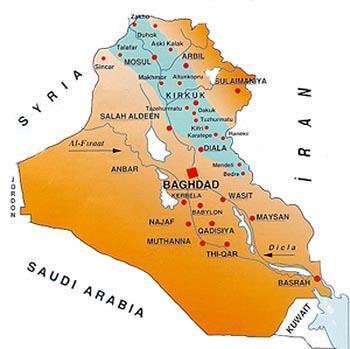|
Note: several
alternative spellings are recognised by English dictionaries ...
Turkmen (plural Turkmen, Turkmens)
Turkoman (plural Turkomans)
Turcoman (plural Turcomans)
Introduction
The Turkomans of Iraq originally came from central
Asia, in a migration that took place over several hundred years,
beginning in the 7th century AD. Today, slightly more than two
million Turkomans are believed to live in Iraq (mainly in the area
shaded blue on the map below). They are Turkish speaking and almost all are
Muslims, though there are also about 30,000 Christians.
|

|
|
Source: Turkmen People
Party |
Their geographical distribution in Iraq is as
follows:
-
Province of Mosul: Telafer, Kadziyeh, Reshidiyeh,
Eski Musul, Eski kelek, Muhallebyeh and Shebek. Estimated Turkoman
population is 450,000.
-
Province of Erbil: Erbil, Eski Kelek, Altinkopru,
Karakus. Estimated Turkoman
population is 215,000.
-
Province of Kirkuk: Kerkuk, Tazehurmatu, Dibis,
Leylan, Terkelan, Kadir Kerem and Da'kuk (Tavuk). Estimated Turkoman
population is 700,000.
-
Province of Salahaddin: Tuzhurmato, Kifri, Bastamli,
Suleyman Beg, Karatepe, Amirli, Yenice, Bablan and Karahasan.
Estimated Turkoman
population is 300,000.
-
Province of Diyala: Hanekin, Mendeli, Kizlarbat
(Saadiyeh), Shahraban (Meqdadiah), Jelawla (Karahan), Kazaniah and
Bedre. Estimated Turkoman
population is 220,000.
-
City of Baghdad:
Turkoman
population is 300,000. [Source: Tukmen People Party]
More information: Wikipedia
Political
background
The Turkomans complain that the Iraqi government
does not recognise them as a ethnic minority or allow their
language to be used in public. The use of Turkish in schools,
government offices and the media was previously allowed under the
1925 constitution, but restrictions began to be imposed from 1972
onwards.
More recently, the creation of a "safe
haven" for the Kurds in northern Iraq after the 1991 Gulf War
resulted in additional problems for the Turkomans. It split them
into two groups: those dominated by the Kurds and those dominated
by the Baghdad regime.
The Turkomans' political importance stems mainly
from their affinity with Turkey, which has difficulties with its
own Kurdish minority. Turkish support for an American attack on
Baghdad would probably be conditional on a protected position for
the Iraqi Turkomans under a post-Saddam government.
The main Turkoman political organisations are:
|